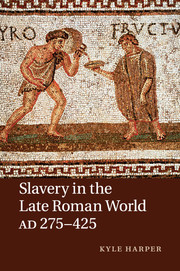Book contents
- Frontmatter
- Contents
- List of tables
- Acknowledgments
- PART I THE ECONOMY OF SLAVERY
- PART II THE MAKING OF HONORABLE SOCIETY
- PART III THE IMPERIAL ORDER
- Introduction
- 9 Citizenship and civil conflict: slave status after the Antonine Constitution
- 10 The enslavement of Mediterranean bodies: child exposure and child sale
- 11 The community of honor: the state and sexuality
- 12 Rites of manumission, rights of the freed
- CONCLUSION
- APPENDIXES
- Bibliography
- Index
Introduction
Published online by Cambridge University Press: 05 August 2011
- Frontmatter
- Contents
- List of tables
- Acknowledgments
- PART I THE ECONOMY OF SLAVERY
- PART II THE MAKING OF HONORABLE SOCIETY
- PART III THE IMPERIAL ORDER
- Introduction
- 9 Citizenship and civil conflict: slave status after the Antonine Constitution
- 10 The enslavement of Mediterranean bodies: child exposure and child sale
- 11 The community of honor: the state and sexuality
- 12 Rites of manumission, rights of the freed
- CONCLUSION
- APPENDIXES
- Bibliography
- Index
Summary
AN ORDER IMPOSED
Late Roman statecraft was famously ceremonial. In a far-flung empire, ruled by a bureaucratic monarchy, political ceremony became a vital interface between the state and its subjects. The movements of the emperor, the victories of the army, the cycles of the civic calendar were all celebrated with lavish spectacles. But military success and imperial itineration were unpredictable. Only the civic calendar provided the regular rhythms of celebration and display on which the late Roman state relied. In this cycle, no event was more significant than the annual installation of new consuls. Late antique political ceremony has been well served in modern scholarship, and the ceremonies surrounding the annual installation of new consuls have been the object of detailed scrutiny. Nevertheless, an important part of the annual ceremony has been almost entirely neglected: the consular manumission of slaves. As part of their installation, the new consuls performed a public manumission, a ceremonial act freighted with ideological significance. The manumission of slaves by the Roman consuls on the first of the year symbolized, in especially compact form, the whole institutional order of the Roman state and its status system.
The consular installation was an imperial ritual synchronized with the natural cycles of Mediterranean festivity, coinciding with the wild atmosphere of the Kalends of January; the Kalends became a sort of universal holiday in late antiquity.
- Type
- Chapter
- Information
- Slavery in the Late Roman World, AD 275–425 , pp. 351 - 366Publisher: Cambridge University PressPrint publication year: 2011



